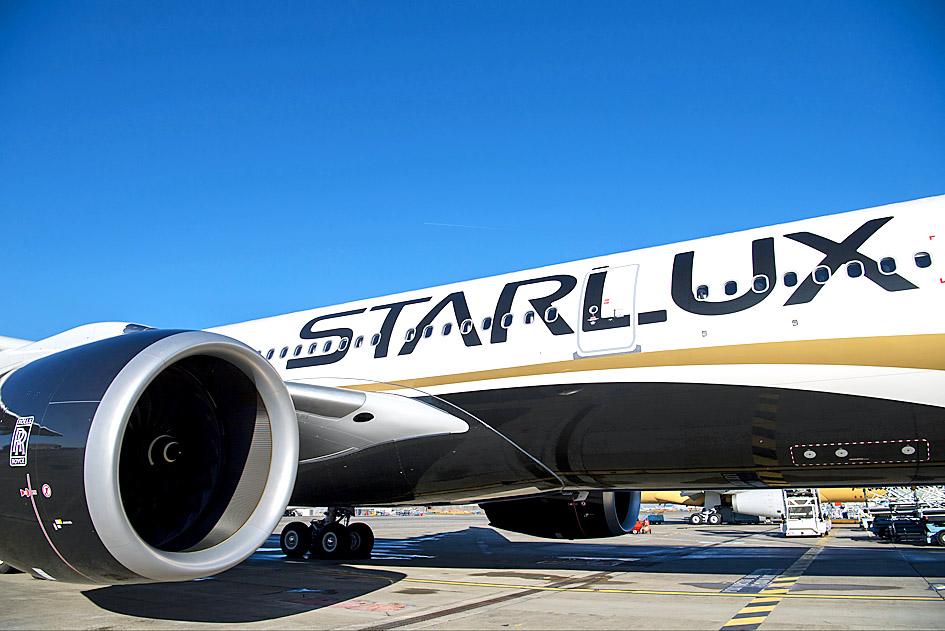Starlux Airlines Co (星宇航空) is expected to take delivery of its first wide-body aircraft, an Airbus A330-900neo, in the middle of next month, before the plane is put into service in May, the carrier said yesterday.
The A330-900neo to be delivered is the first of eight to be operated by StarLux under a leasing deal, with three more of the model expected to arrive in Taiwan this year, it said.
Since Starlux’s first flights on Jan. 23, 2020, it has been operating a fleet of leased Airbus A321neos, the sixth of which arrived in Taiwan on Jan. 2, the airline wrote on Facebook.

Photo courtesy of StarLux Airlines Co
Starlux operates flights from Taiwan Taoyuan International Airport to destinations including Bangkok, Ho Chi Minh City, Kuala Lumpur, Manila, Macau, Osaka, Penang, Singapore and Tokyo, and is to launch new services to Fukuoka, Japan, next month.
Starlux plans to deploy the A330-900neo on routes to key capitals in Asia, such as Singapore and Bangkok, a plan first unveiled in late 2019, when it was considering introducing the Airbus model.
The carrier said it was still in talks with the plane maker on delivery of 17 Airbus A350s, which it ordered in March 2019 and were to begin being delivered late last year.
Starlux said it hoped to have its first A350 aircraft in the middle of this year.
As part of an introduction of the new A330-900neo, Starlux yesterday began selling merchandise specially produced for the model, including a travel pillow and a key chain that looks like a plane’s seatbelt.
The merchandise is available on Starlux’s Web site, as well as at a cobranded 7-Eleven store near Nanjing Fuxing MRT station in Taipei and the carrier’s shop at the Honhui Plaza (宏匯廣場) shopping mall in New Taipei City’s Sinjhuang District (新莊), it said.

Taiwan would remain in the same international network for carrying out cross-border payments and would not be marginalized on the world stage, despite jostling among international powers, central bank Governor Yang Chin-long (楊金龍) said yesterday. Yang made the remarks during a speech at an annual event organized by Financial Information Service Co (財金資訊), which oversees Taiwan’s banking, payment and settlement systems. “The US dollar will remain the world’s major cross-border payment tool, given its high liquidity, legality and safe-haven status,” Yang said. Russia is pushing for a new cross-border payment system and highlighted the issue during a BRICS summit in October. The existing system

Taiwan Semiconductor Manufacturing Co (TSMC, 台積電) is expected to grow its revenue by about 25 percent to a new record high next year, driven by robust demand for advanced technologies used in artificial intelligence (AI) applications and crypto mining, International Data Corp (IDC) said yesterday. That would see TSMC secure a 67 percent share of the world’s foundry market next year, from 64 percent this year, IDC senior semiconductor research manager Galen Zeng (曾冠瑋) predicted. In the broader foundry definition, TSMC would see its market share rise to 36 percent next year from 33 percent this year, he said. To address concerns

Intel Corp chief financial officer Dave Zinsner said that a formal separation of the company’s factory and product development divisions is an open question that would be decided by the chipmaker’s next leader. Zinsner, who is serving as interim co-CEO following this month’s ouster of Pat Gelsinger, made the remarks on Thursday at the Barclays technology conference in San Francisco alongside co-CEO Michelle Johnston Holthaus. Intel’s struggles to keep pace with rivals — along with its deteriorating financial condition — have spurred speculation that the next CEO would make dramatic changes. That has included talk of a split of the company’s manufacturing

PROTECTIONISM: The tariffs would go into effect on Jan. 1 and are meant to protect the US’ clean energy sector from unfair Chinese practices, the US trade chief said US President Joe Biden’s administration plans to raise tariffs on solar wafers, polysilicon and some tungsten products from China to protect US clean energy businesses. The notice from the Office of US Trade Representative (USTR) said tariffs on Chinese-made solar wafers and polysilicon would rise to 50 percent from 25 percent and duties on certain tungsten products would increase from zero to 25 percent, effective on Jan. 1, following a review of Chinese trade practices under Section 301 of the US Trade Act of 1974. The decision followed a public comment period after the USTR said in September that it was considering